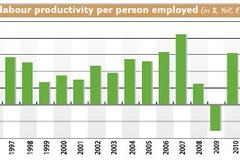Career and HR, page 16
Employment news from Slovakia
Corporate feedback is a two way communication channel that keeps MBA course content relevant to the needs of the private sector
It goes without saying that business schools have strong ties to the private sector. At institutions like the University of New York in Prague (UNYP) we not only work with top Czech and international companies to recruit MBA program applicants, but many executives from these companies also give lectures for our courses; or their companies are involved in case study and research projects.
Positioning yourself for success
“Thank you for your application, but your profile does not fit the requirements; we consider you overqualified,” is the answer that many experienced candidates get when looking for a job – assuming they get any, since the national sport among Slovak employers is to not respond to applicants at all.
Self-employed face challenges
For some people, being self-employed, which means having a license to run one’s own business, is a viable way to earn a living and avoid unemployment. However, recent legislative changes to the Labour Code that pertain to this group have already caused a number of the self-employed to change their status, observers have warned.
Adjusting to needs of the market
A Alack of qualified labourers in certain industrial sectors, an overly complicated system of school financing and too many young people studying subjects in humanities are some of the most troubling factors affecting the Slovak education system, according to Education Minister Dušan Čaplovič. His solutions, however, have not been universally welcomed. Foreign businesses continue to stress fostering ties between academia and business and are ready to offer a slew of recommendations for the minister to consider.
2013 promises a rocky ride
2013 is shaping up to be a tough year for Slovakia. In December 2012 the country recorded its highest unemployment rate in more than eight years and the labour market will remain in a state of caution, bracing itself to withstand the effects of fiscal consolidation as well as a major revision to the country’s Labour Code. The latter has attracted divergent responses, with the government saying it brings balance but employers warning that it might push up unemployment.
Managing employees - an asset or a future competition for an employer
Some employers think that finding an excellent manager is mission accomplished and that subsequently work will go smoothly without further effort. But legal practice sometimes shows otherwise. In any case, compliance with the law, proper motivation, and clear contract terms, are an essential basis for successful cooperation between a company and its manager.
Headhunting via social networks
The boom in online social networks has provided headhunters with a range of new tools, which they can use to search for candidates, keep in touch with potential applicants and even verify information about them. However, jobseekers too can make use of similar tools to find jobs, by creating and regularly updating an information-rich profile detailing their experience, or by joining various online forums and discussions. HR professionals typically use LinkedIn or Xing as their main social networks, and tend not to consider Facebook to be a principal source of information, although they urge users to be cautious about sharing personal data via the site.
Revised Labour Code gets mixed reception
Slovakia has a new Labour Code, again. Robert Fico’s second government moved to revise Slovakia’s most significant employment law soon after taking power following its landslide election victory in March 2012. While trade unions have welcomed the revision and, like the Labour Ministry, regard it as an improvement in employee protection, the business sector blames it, along with the fiscal consolidation measures passed at around the same time, for prompting an increase in unemployment, worsening conditions for the creation of new jobs and for creating more red tape for businesses. Nevertheless, dismissing workers in Slovakia remains significantly cheaper than in western Europe, a recent study suggests.
University of Veterinary Medicine and Pharmacy in Košice
One of the few accredited European universities offering an advanced veterinary study programme in General Veterinary Medicine leading to a DVM degree. Proud 20-year history of teaching the art and science of veterinary medicine in English,with hundreds of graduates working in their respective fields back in their home countries.
How to calculate income tax and payroll levies
Each self-employed individual or person with a trade licence can choose whether to use single-entry bookkeeping, in which he (or she) records business-related expenses, or instead take advantage of a 40-percent lump-sum allowance for expenses, in which case he does not account for specific outgoings but merely deducts a flat 40 percent from his income in lieu of receipted expenses. From January 1, 2013 onwards this deduction has been capped at €420 per month or €5,040 per year. Depending on the approach one chooses, personal income tax is calculated as follows:
Productivity rises bring little cheer
Labour productivity in Slovakia is growing, fuelled by investments and job cuts, with the latter also curbing wage growth. In 2013 productivity growth is forecast to continue outpacing wage growth. But given the current economic conditions, experts say, this improvement in productivity is not so much an advantage as an absolute necessity in order to survive amidst heightened competition.
Europe prefers qualified workers
Slovakia’s entry into the European Union in 2004 has opened the gates for Slovaks to jobs throughout the union while making the whole administrative process simpler, mainly thanks to the EU-guaranteed right of free movement of people. Yet, entering the international market means that job applicants aspiring for international jobs must play in a different league. Requirements for the qualifications of job applicants from Slovakia are changing and low-qualified people who do not speak a foreign language often have problems finding a job, according to Alena Házašová, a coordinator for European Employment Services (EURES), a European job mobility portal.
Examining the benefits
“Benefits should be conferred gradually; and in that way they will taste better,” wrote Niccolo Machiavelli, Italian thinker, diplomat and the father of political theory. A benefit, as we understand it within the HR sector today, is non-wage employment compensation.
Unemployment continues to rise
The jobless rate in Slovakia continues to increase, hitting new records each month. Analysts and politicians attribute its rise in December 2012 to over 14 percent, its highest level in nine years, to the economic situation in Slovakia and the influence of the whole eurozone, as well as to consolidation measures adopted by the second government of Robert Fico. The government and the prime minister nevertheless remain optimistic about the unemployment rate and are promising creation of new jobs. Many analysts and employers do not share their optimism, however, and do not expect the situation to improve until next year.
Applying neuroscience into leadership field moves assessments to a new level
Many organisations are not flexible enough to adapt to the dynamically changing environment and then utilise the potential of their key people. One of the common reasons for this might lie in the discrepancy between the internal setting of the company and the inner world of the individual employees. And it is this discrepancy that causes unproductive conflict that negatively influences further development of the company.
Can your boss read your emails?
And can he watch you using a camera system? Can he record your telephone calls at work? And can you be dismissed based on what he finds?
The regions and sectors in which people work matter
Pharmaceutical, IT and banking remain the highest paying sectors in Slovakia, while engineering, electrical engineering and automotive pay the lowest below the market average. but the city or region in which people work is a significant factor, as a job in Bratislava can pay as much as a third more than the same job elsewhere in Slovakia, according to a PayWell remuneration study for 2012. The PwC HR Consulting team conducted the study among 296 companies operating in Slovakia, dividing Slovakia into four regions: Bratislava, West, Central and East.
The business books of 2012
In this uncertain and unpredictable world it is possible to find inspiration that can actually help run a business. Apart from learning from each other, one can look for ideas in literature that addresses at least some of the issues that business leaders currently face. Here are some of the books that have been published recently that are worth reading:
Human resources sector highlights
In the near future, companies plan to focus their human resources activities on talent management, internal process efficiency, performance assessment and performance management systems, more effective systems of employee development, design and implementation of competence models, and remuneration and benefit systems, according to a KNO SLOVENSKO survey conducted in 2012. The same survey also identified blended learning, management simulations and neuro-leadership as the most interesting development products among Slovak HR managers.
The challenge for 2013: Higherperformance on a lower budget
How to generate increased performance among employees, but with a decreasing budget, will be one of the tough puzzles that human resources professionals have to face in 2013, according to experts in the sector. They also agree that changes to Slovakia’s key labour legislation, its Labour Code, will negatively impact the willingness of employers to hire new people.
- Ambulance hit by Russian drone goes on display in centre of Bratislava
- Slovakia’s public finances remain in deep trouble
- News digest: Police linked to Fico gunman video leak – minister accused of cover-up
- Police bosses handed cut-price “luxury” flats in Bratislava
- Perk, Trnava: “Stylish, affordable, and seriously tasty” – restaurant review
- Slovakia’s labour market falters as migration policy falls behind EU neighbours
- Hundreds of people ousted from Bratislava’s Volkswagen
- Cyclists, sausages and a railcar called Hurvínek Photo
- Ambulance hit by Russian drone goes on display in centre of Bratislava
- Slovakia’s public finances remain in deep trouble
- Bratislava’s embassy-backed events you don’t want to miss
- 3 free things to do in Bratislava in the next seven days
- Slovakia mourns Pope Francis, a shepherd of hope and humility Photo
- Perk, Trnava: “Stylish, affordable, and seriously tasty” – restaurant review
- Hundreds of people ousted from Bratislava’s Volkswagen
- “Return not,” the ocean cried. But I returned for her
- Ambulance hit by Russian drone goes on display in centre of Bratislava
- “Return not,” the ocean cried. But I returned for her
- Bratislava’s embassy-backed events you don’t want to miss
- The British Film Institute shines a light on Slovak cinema’s boldest chapter Video
- Slovakia’s public finances remain in deep trouble
- 3 free things to do in Bratislava in the next seven days
- Slovakia mourns Pope Francis, a shepherd of hope and humility Photo
- When to shop over Easter: Opening hours for supermarkets in Slovakia
- “Return not,” the ocean cried. But I returned for her
- Ambulance hit by Russian drone goes on display in centre of Bratislava
- 3 free things to do in Bratislava in the next seven days
- German shoemaker Lowa joins wave of factory closures in Slovakia
- US giant pulls plug on Slovak factory, axing 137 jobs
- Hundreds of people ousted from Bratislava’s Volkswagen
- Bratislava’s embassy-backed events you don’t want to miss
- When to shop over Easter: Opening hours for supermarkets in Slovakia
- News digest: Police linked to Fico gunman video leak – minister accused of cover-up
- Police bosses handed cut-price “luxury” flats in Bratislava
- Cyclists, sausages and a railcar called Hurvínek Photo
- Slovakia’s labour market falters as migration policy falls behind EU neighbours
- Remembering the priest-scientist and pioneer of wireless communication
- Perk, Trnava: “Stylish, affordable, and seriously tasty” – restaurant review
- What is Pope Francis’s message to the powerful?
- Slovakia mourns Pope Francis, a shepherd of hope and humility Photo More articles ›



















